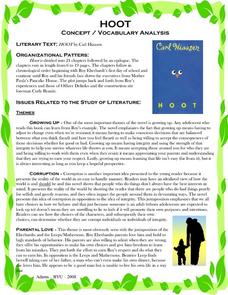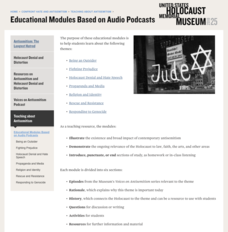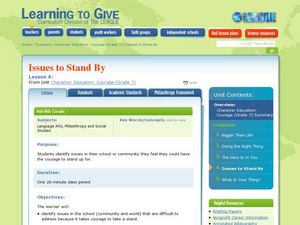Federal Reserve Bank
History of Money and Banking in the U.S.
Why was there a lack of confidence in the money and banking system of the early United States government? What historical events led to the establishment of the Federal Reserve System? Here you'll find reading materials and worksheets to...
Curated OER
Hoot: Concept/Vocabulary Analysis
Augment your unit on Carl Hiaasen's Hoot with a series of activities about the environment, civil disobedience, making an impact in the world, and growing up. A list of literary concepts and themes helps you to write your lessons to...
EngageNY
Launching the Module: Quotes about the Middle Ages
Pick a corner. Scholars receive a quote about the Middle Ages and then participate in a four corners activity by choosing a corner pertaining to their quotes. They then work in groups of three to discuss the bold words in their quotes....
Oklahoma State Department of Education
Narrative Prompt
Reading about history is nothing like experiencing it firsthand. Encourage your eighth graders to do the next best thing with a historical narrative prompt, in which they describe the experience of a first-time traveler on the...
US Holocaust Museum
Educational Modules Based on Audio Podcasts
Imagine hearing someone claim an event like the Holocaust never happened. Pupils use audio podcasts and reading passages to dive into the lives of those impacted by the Holocaust of World War II. Using the information they gather, class...
Curated OER
Women in India: Tradition vs. Modernity
Students explore cultural aspects such as gender roles and their impact on Indian culture and compare and contrast issues associated with those roles in America through literature.
Curated OER
Issues to Stand By
Students explore the concept of courage. In this character education lesson plan, students consider how to have the courage to stand up and fight for community issues.
Curated OER
What Is Your Gripe?
Pupils discuss historical examples of social injustice and identify perceived social injustices today. They share incidents in their lives when they confronted such experiences.
Curated OER
Anthropology and Sociology
Students examine the combined subjects of anthropology and sociology and explain how the disciplines would study the same issue. On poster board, they locate or draw pictures related to the two subjects. Once this is completed, students...
Curated OER
A "State of the Arts" Coin
Students study the historical figures depicted on the quarter and explore how symbols of U.S. patriotism were used in its various designs. They research symbols of Texas and choose one to draw in a design for a Texas
quarter. in...
Curated OER
Our Global Community
First graders experience literature which shows how communities live around the world. In this global community activity, 1st graders read books such as Whoever You Are, by Mem Fox and create a work of art based on their feelings about...
Curated OER
Food Makes the World Go Round
Fifth graders investigate the origins of foods they eat while they consider social justice issues. In this food sources lesson, 5th graders play a game and then research food distribution, food security, and hunger in the world today....
Curated OER
Injustice on Our Plates: Immigrant Women
Students investigate the plight of undocumented workers. In this social justice lesson, students research undocumented workers as well as consumer boycott movements and write about their impressions.
Curated OER
We and Thee
Students examine class structure. For this diversity education lesson, students discuss stereotypes within their school as an introduction to Shakespeare's Romeo and Juliet. After students have read the play and discussed social class...
Curated OER
Confronting the -Isms
Learners keep "Mindwatch" diaries to chart their own prejudices and stereotypes. For this social justice lesson, students monitor their own reactions to people who are different from themselves. Learners identify and discuss patterns of...
Curated OER
The Gentle Art of Persuasion: Techniques for Persuading Different Audiences
Students examine the use of persuasive arguments to varying audiences. They define persuasion, read and discuss an article on whether P.E. should be optional, summarize the pros and cons of P.E., and write a letter or a speech.
Curated OER
You've Got Chocolate on my Peanut Butter
Students solve design problems. In this art and design lesson, students create a picture by analyzing two others, and make a prototype of a building. The small group activities call for creativity and ingenuity as well as the ability to...
Curated OER
Posters with a "Twist"
Students examine how posters can depict history and reflect societal issues of an era. They apply principles of poster art to create original posters reflecting society in 19th century England.
Curated OER
Digital Divide
Students research different "divides" and apply their research to the Digital Divide. They determine the race, gender and socioeconomic issues involved in this issue and why it is relevant.
Curated OER
The First "Colored" World Series
Students utilize reading and listening skills in order to discover the key issues in American history and Black baseball history. Students investigate the beginning of the Negro Baseball Leagues and its signature historical baseball...
Curated OER
The Power of Fiction
Learners explore fiction that moves individuals to social action. In this literature lesson, students read The Jungle by Upton Sinclair and analyze its literary worth as well as its investigative journalism. Learners investigate other...
Curated OER
Good and Evil
Students examine the art of Henry Darger as an impetus to discuss the concepts of good and evil. They investigate why people have been fascinated with good and evil from biblical times to the present.
Curated OER
No Bigger Than a Minute
Young scholars view a video clip about ideas displayed through images. They work together to analyze paintings and complete activities. They discuss how media representation of an issue can affect one's viewpoint.
Curated OER
The City Symphony- The Original Reality Show
Learners discuss the purpose of city symphonies that were used in the past. In groups, they compare and contrast the social systems of a school and city to create their own city symphony video together. They also write what is known as...























